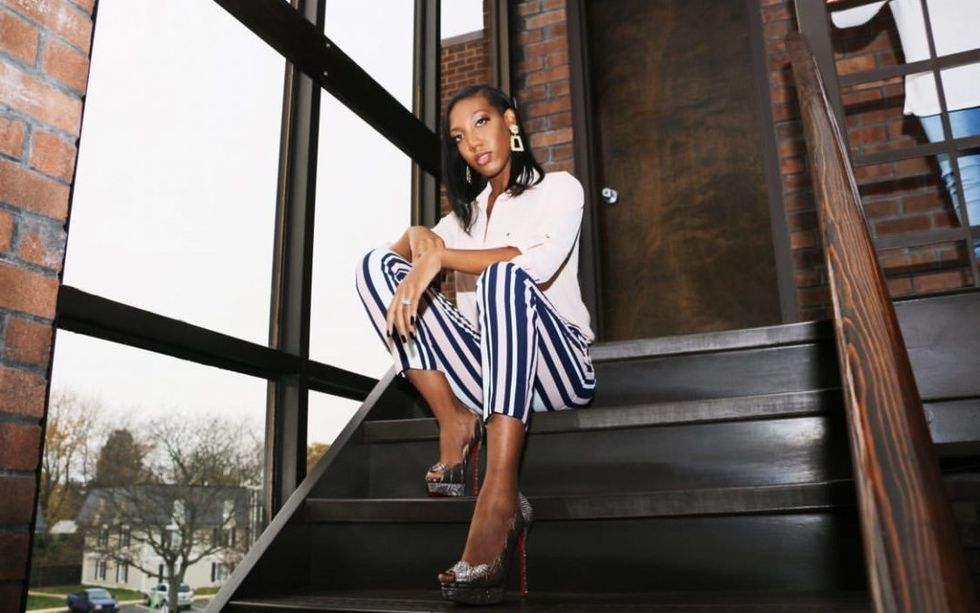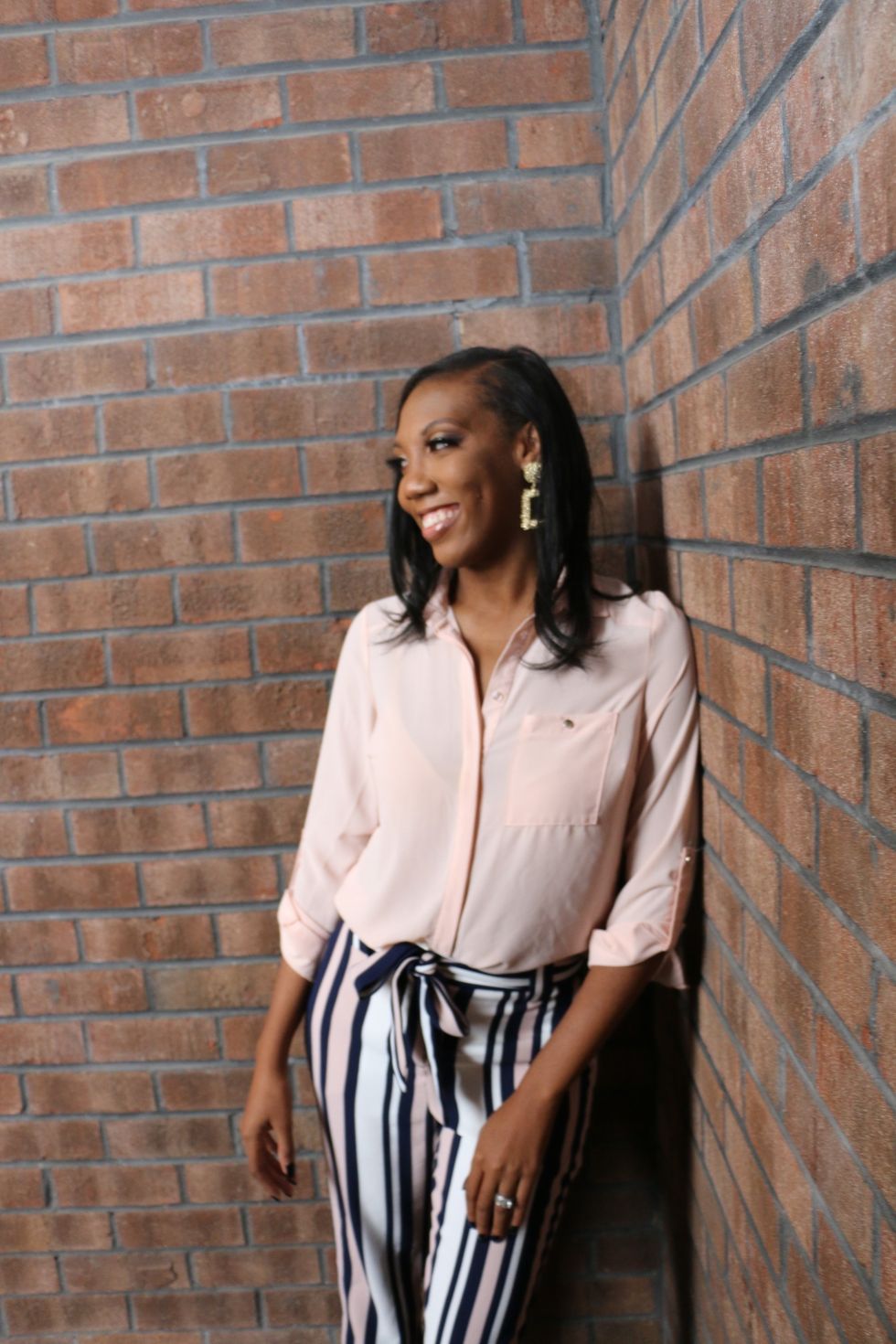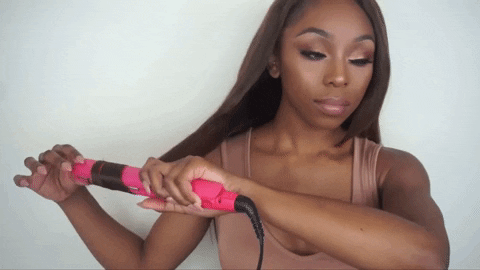
This is what financial freedom looks like. It looks like being completely debt-free, student loans and all. It's doing work that you love and not just settling for a steady paycheck at a job you hate, or maybe packing up the kids and taking them on trips to St.Thomas, Ocho Rios, or to the Discovery Children's Museum in Las Vegas. And in the case of Jamisa McIvor-Bennett, it also looks like a $3.2 million real estate portfolio with 21 properties— all paid for in cash with the exception of one home.
It all started with an unexpected question that would lead to a life-changing opportunity when a 19-year-old McIvor-Bennett, then a cashier at ShopRite Supermarket in Philadelphia, was approached by her grandmother. "She said, 'I just wanted to know what would happen to the house if something was to happen to me?' I said, 'Grandma I'm not really sure, I can find out.' She was like, 'No, I was just asking because, if something was to happen, I want you to take full responsibility for it. You're the most responsible one.'"
At the insistence of her grandmother, the pair did a quitclaim deed transfer, allowing her grandmother to transfer the property to McIvor-Bennett for $400 total once the dust settled. Over a year later, her grandmother passed away unexpectedly, and all hell broke loose as the family clamored to make claim to the home, unaware of the agreement between McIvor-Bennett and her grandmother. "We made a video because this is during the era of record everything, so I had what I needed in terms of a paper trail."

With no knowledge about financial literacy or real estate, McIvor-Bennett got to work on researching her best options for turning a lemon into lemonade. She didn't have the funds to make the necessary repairs to the home, so she decided to sell the paid-off abode for $152,000 at the encouragement of a real estate agent. And thanks to advice from a real estate investor turned mentor, she used the profit to purchase her first home in cash for $400— a house that she still owns today and that's worth $330,000.
Gaining more knowledge and experience through mentorship and mistakes, McIvor-Bennett has since bought 21 properties worth $3.2 million in the Philadelphia area, affording her a lifestyle that at one point never seemed imaginable for the now-married mother of two. Seems impossible? Well, don't just take our word for it. The real estate mogul is spreading knowledge on the power of investing through her company Rosebud's Investments to those looking to get in the game. "I have so many people who are interested in real estate investment just by seeing my lifestyle change gradually," McIvor-Bennett says.
xoNecole chatted with the self-made millionaire for tips on tapping into lucrative deals and how to build generational wealth through real estate investing.
1.Learn From Others’ Mistakes

Courtesy of Jamisa McIvor-Bennett
"I learned so much from my mentor just through his mistakes. He gave me a lot of information, but he showed me a lot of stuff just because I was paying attention. He was a really big dreamer. He would get really good deals and run out of money. That's why he ended up selling me the properties he did out of desperation because he was locked into a deal and ran out of money to finish it and needed to close. So he was selling off what he had just to get their money to get through that next deal.
"The second time he did it, it ended up helping me because I was down to my last $50,000. And he was like, 'I need money.' So I'm like, 'All right, I'm going to give you the money to finish your deal, and you give me back the money in interest.' And he did. He gave me 25% interest on my return. But I learned a few things— don't get into these high ticket deals without a contingency fund. I was taking notes, which is why it took me so long. I didn't get any mortgages until literally the 13th of December [2019]. So all of these houses later, I was kind of scared because of what I watched him go through."
2.Don’t Overlook Ugly Houses
"The second house sold to me was for $6,500. It looks like a scary movie. I call it the Treehouse, literally, there was a tree growing inside. But I bought it because it was $6,500, and my mentor had purchased it for $2,500. Even though it was ugly, it was structurally sound. So it wasn't one of those things where I had to do anything to it. We put a new roof on it, boarded it up to winterize it, and made sure it was safe. We had to buy a vacant property permit for it. I didn't know what equity was, I was just buying time until I conjured up enough to figure out what I wanted to do at home, but it was worth a lot. Year two [of investing], I started to really get into markets and stuff like that. By year three, the house directly up the street had sold for almost $200,000, and it was smaller than mine. I didn't know it was going to end up being a good deal, but now I knew that buying a house for $6,500 was OK."
3.Check The Comps
"When you're in real estate, you do what's called comps, or comparable property. So if you ever want to know what your house is worth, you have to find something that's comparable to it. Then we look at the work that was done to it. Obviously, if I put a waterfall and elevator in my house, and you got a little patio and vinyl sliding, mine is going to be worth a little more. But this is how you compare the numbers and you look at what [the] dollar consistency [is] in that area. You look at the last three things that sold and you get the average."
4.Buy Cheap Properties At Auctions
"When you buy a house in an auction, you get the equity, but you don't get the debt. There are actually nice houses sometimes, especially foreclosures. Somebody went through the whole mortgage process and out of the 30 years they might've had a good 125 months and they can no longer pay the mortgage. You are getting all of that equity per penny on a dollar because somebody else fell on hard times, which is bad for them, it's very sad. But if they're losing it anyway, you just happen to be the one to purchase it.
"I had purchased my own property for $1,700, and what was really interesting about it was that when I purchased it, I didn't even have to buy it. I had the money. But when you are at an auction, you can't pay for it there. You have to actually finalize your paperwork elsewhere on another day. I had to put down a deposit. The deposit is either 10% or $600, whichever is the highest. After that you have 30 days to do one or two things, the first thing you can do is obviously pay the remaining balance. But the second thing that you can do is sell the property, which I thought was really cool. I ended up returning like two or three days later and then I decided to go back every single month because they had them every month. I still have the $1,700 property. Right now the comp in the area is like $175,000. It's a bad area, but it's coming up. So I will just wait."
5.Buy Properties With Positive Cash Flow
"For myself, I'm looking for positive cash flow. I'm an urban investor so I like to stay true to my roots. I think people spend a lot of time focusing on gentrification, and they are pushing us out. I got a home that's in the city right now that's worth $600,000, you can't tell me that I'm being pushed anywhere. I typically stick to urban properties and the overhead is way less. We usually have about 1,200 to 1,600 square feet, depending on if it's a corner house or not. So with that being said, it's only but so much work that needs to be done to a house of that size."
6.Decide If You Want To Flip Or Rent
"As an investor, I never went in with the intention to flip. I sold one or two during the course of time just because I needed some fast cash and because I'm living off of the rental income, so I was like, 'All right, let me free up something.' Then I would sell one and replace it with two more, but I wasn't really interested in the flipping aspect. Some people need a quick flip. I have children and I like freedom. To me, flipping is too much of a job. You do all this to make money to then do what? You have to do it again because once you get the money, you've got to spend it on something. I like the idea of buying a house and renting it out. Right now my portfolio total is $3.2 million, cash flow is a little under $50,000 a month."
7.Look For Hard Money Lenders

Courtesy of Jamisa McIvor-Bennett
"Hard money lending is a go-to for investors because it doesn't require tax returns and you don't need anything except a good deal because they're funding you based on how much the property is worth. You do need 10% of the money because they'll give you money to purchase and rehab it, but they don't give you the money to fix it up outright. So you have to actually put money into it and then they reimburse you. And when they reimburse you, you use the reimbursement money to keep going. When you are getting a regular loan from a bank, they need at least two years of consistent tax returns. With hard money lending, you decide how much the house is worth. So it's easier to get funding, but you have to pay more upfront and altogether because it's interest-only payments too.
"The benefit of it is [money] is accessible fairly quickly. But you got to do it right because the first couple of payments are interest-only payments, and then you still owe whatever you borrowed. So let's say you did $100,000— $50,000 to purchase and $50,000 to rehab, times it by 10% interest. You owe $10,000 additional on a loan, where a normal loan is usually around 3.5% percent or so. So now you divide that $10,000 by 12 months because usually the loan is between 12 to 13 months. You have to pay them $830 every single month. Then at the end of the loan, you still give them back their whole $100,000."
8.Cash Is Still King
"You definitely get more of a return when you leverage, but the moment that you get a mortgage you owe somebody else. The market goes up and down, and what can end up happening is if the market crashes like it did last time, the value of your property decreases, which is why it's good to be an owner. Let's say for instance you bought a property worth $100,000. A bank will give you up to 80% of what the property is worth. So at $100,000, they will give you the $80,000 to play with. Then the market crashes, now the $100,000 property is only worth $60,000.
"You borrowed $80,000, so now you owe $20,000 more than what it's even worth. Not to mention most people who are investing don't even live in their investment property, so they still maybe have a mortgage. Now, you're struggling to even pay what you owe. If you are a more financially stable person, you can move money around, and then investors do things called diversification, so they have different streams of income other than [real estate] investments. But it depends on what your risk tolerance is."
9.If You Don’t Have The Cash, Consider Wholesaling
"Wholesaling isn't hard at all. You find a seller and you find a buyer. The most involved part is having time. That's what people underestimate. If you don't have credit or money, you have to have time, because the hardest part of wholesaling is finding a seller. But it's definitely not difficult depending on the numbers. Let's say a friend came to you like, 'Listen, I've got this house, I'm over it. I want to sell it for $80,000.' You sign a contract. You don't actually have to have the money when you sign a contract because the contract says that if the original buyer can't secure funding or can't close, they have the right to assign it to somebody who can. You sign a contract agreeing to purchase it for $80,000. You know I buy houses. You call me like, 'Hey, I have a house for sale for $100,000,' and if the numbers make sense and it's worth what you're asking for, I buy it and you give her $80,000 and take the other $20,000."
10. Protect Your Primary Residence
"Every person's situation is different, but I'm not going to ever tell a person to outright start with debt unless they absolutely have to. Once you lock into a 30-year mortgage, you owe them, no matter what. If things go right, good. If things go bad— you lose your job or you break your foot — you owe [the bank], and this is your primary residence. You want to always make sure your home is safe. You should be in a situation where your assets protect your liabilities. Even if you live in a house and you're like, 'I love it, it's beautiful,' it's a liability. It doesn't do anything for you other than makes you happy when you see it. You live there so you're not getting any gains from it."
11. Consider Investing In Multi-Family Units
"The idea is you get a mortgage and you get a multi-unit as opposed to a single-family. A multi-unit can be a duplex or a triplex, or it can even be a quad, which is four units. You live in one unit, you rent out the other units, and what they pay covers what you owe. Now it's not so much of a hassle on you, and then at the end of the day, you are still building equity. So if you ever decide you want out, you can still pull the equity out of your house and then reinvest it into a single-family, or you can go on to a nicer house and a nicer place."
12. Change Your Mindset Towards Money
"Believe it or not, people in urban communities have a whole lot of money. You still got people like, 'I'm not ready to buy,' and I think they're just afraid. When it comes to these properties, these tenants, they spend money consistently. I've met people who've rented for years straight, never missing a day. How do you have the discipline to know that you have to pay a landlord, but you don't have equal discipline to pay yourself? How do you invest in somebody else's equity and tell yourself you're not good enough to do the same thing for yourself? And they do it time and time again."
13. Ignore The Naysayers
"I tell people, it's not what you do is how you do it. I see people posting like, 'It's not like she got it from the muscle.' I did. [My grandmother] didn't give me 20 houses at random, she gave me an opportunity and I made the best of it. I've read, 'Oh she sold her family's legacy for money.' No, I've created a legacy. There was none."
Jamisa McIvor-Bennett is the proud owner of Rosebud's Investments, which offers individualized services in investor processes, for both new and seasoned investors who are looking to enhance their knowledge and expertise, and helps provide a blueprint for purchasing property without using credit.
Featured image courtesy of Jamisa McIvor-Bennett
Originally published on March 2, 2020.
- How to Make a Million Dollars from Real Estate: A Step By Step Path ›
- How to Build a Multi-Million Dollar Real Estate Portfolio with Ayesha ... ›
- How To Build A Real Estate Empire Before You're 30 | How-To Guide ›
- How An Immigrant Built A $20 Million Real Estate Portfolio - How to ... ›
- The Multi-Million Real Estate Empire of Grant Cardone ›
- A Step-by-Step Guide to Making Your First Million in Real Estate in ... ›
- How to Build a Million Dollar Real Estate Portfolio in 10 Easy Steps ›
This Is How To Keep 'Holiday Season Stress' From Infecting Your Relationship
Hmph. Maybe it’s just me, but it seems like there is something really weird happening in the fall season air (because winter doesn’t officially begin until December 21) that cuddle season is in full swing while break-up season is as well. In fact, did you know that break-ups are so popular during the holiday season that December 11 is deemed Break-Up Day?
The reasons why relationships shift around this time vary; however, I did both roll my eyes and chuckle when I read that a very popular one is because it’s an easy way to get out of getting one’s significant other a Christmas present. SMDH.
Anyway, I personally think that the less shallow folks out here may contemplate calling things “quits” or they at least distance themselves a bit from their partner (and what I’m referring to is serious relationships) due to all of the stress and strain that oftentimes comes with the holidays whether it be financial, familial, due to their tight schedules or something else.
Listen, I would hate for you and your man to miss the fun and happiness of experiencing this time of year, all because you are so overwhelmed or irritated that you can’t really enjoy it. That’s why I have a few practical tips for how to avoid allowing the typical holiday season stress from INFECTING your relationship.
Manage Your Expectations
 Giphy
GiphyUnmanaged expectations. If there is a main reason why the holiday season tends to be so stress-filled for so many people, I’d bet good money that this is the cause. And when you’re in a long-term relationship, expectations can manifest themselves in all sorts of cryptic and/or unexpected ways. You might have relatives who assume that you are going to be with them for Thanksgiving or Christmas when you have other plans in mind. You might be thinking that you are going to spend one amount for presents while your man is thinking something totally different. When it comes to scheduling, your signals may be crossed.
And you know what? To all of these scenarios, this is where clear and consistent communication come in. Don’t assume anything. Don’t dictate anything either. From now until New Year’s, mutually decide to check in once a week, just to make sure that you are both on the same page as it relates to the holidays and what you both are thinking will come along with it. The less blindsided you both feel, the less stressed out you will be. Trust me on this.
Set (and Keep) a Budget
 Giphy
GiphyOkay, so I read that last year, 36 percent of Americans incurred some type of holiday-related debt. Hmph. Last year, there was still some sense of normalcy in this country, chile, so I can only imagine what finances are gonna look like over the next several weeks. That said, since I don’t know a lot of people who don’t find being broke stressful, make sure that you and your bae set a budget and then stick to it this year — no ifs, ands or buts.
Because really, y’all — it doesn’t make sense to deplete savings and/or max out credit cards for a few days of giggles only to be damn near losing your mind because you don’t know how to make ends meet come Dr. Martin Luther King, Jr. Day.
And by the way, this tip doesn’t just speak to things like food and gifts; I also mean travel. If it doesn’t make a ton of sense (or cents) to be all over the place this year — DON’T BE.
Keep Matthew 5:37 at the Forefront
 Giphy
GiphyIf off the top of your head, you don’t know what Matthew 5:37 says, no worries, here ya go: “But let your ‘Yes’ be ‘Yes,’ and your ‘No,’ ‘No.’ For whatever is more than these is from the evil one.” That verse right there? Oh, it’s a boundaries lifesaver! I say that because do you see “maybe” or “I’ll think about it” in there? Nope. LOL. It says that you should tell people “yes” or “no” and leave it at that — and that complements Anne Lamott’s quote, “’No’ is a complete sentence” impeccably well. Yeah, you’ve got to remember that anything beyond a yes or no to a request is privileged information; you don’t owe anyone details or an explanation.
Besides, if you are really honest with yourself, when someone asks you something and you give a “Umm, let me think about it” kind of reply, more times than not, you already know what your answer is going to be — so why not let you both off of the hook? Give your response. Commit to that. And let everyone (including yourself) get on with their lives and schedules.
I promise you that when it comes to those holiday parties, you are pissing more folks off by not RSVP’ing or doing so and not showing up than just saying, “Thank you but not this year” off the rip.
Remember That Your Personal Space Is Privilege Not a Right
 Giphy
GiphyA friend of mine recently bought a new house and invited me over to come see it. He’s a single man with no children, so as I was taking in all of the space that he had, especially as I walked through his finished basement, I joked about relatives coming to live with him. “Hell no” and “absolutely not” were pretty much his immediate responses as he went on to say that some folks even had the nerve to be offended when he told them that he had no intentions on taking DNA in.
Ain’t it wild how people think that your stuff is their right? And yes, that brings me to my next point. Your home is your sanctuary space. If you want to host folks this year — cool. If not, ALSO COOL. Please don’t let folks (family included) guilt you into how they want you to act or even into what they would do if the shoe was on the other foot. You are not them — and as one of my favorite quotes states, “If two people were exactly alike, one of them would be unnecessary.” (A man by the name Larry Dixon said that.)
Hell, my friends? They know that I am good for sending them random things that they need or even want all throughout the year. Coming over to hang out at my pace, though. Uh-uh. Chalk it up to being a card-carrying member of the ambivert club yet I like keeping my living space personal — and I sleep like a baby, each and every night, for feeling that way.
Always remember that your space, your time, your resources, your energy and shoot, yourself period (including your relationship), are all things that are your own. You get to choose how, when and why you want to share them. The holiday season is certainly no exception.
Cultivate Some “You Two Only” Traditions
 Giphy
GiphyIt’s not uncommon for some couples to hit me up after the holiday season to “detox.” Sometimes it’s due to the financial drama (and sometimes trauma) that they experienced. Sometimes it’s because they allowed their relatives (especially in-laws) to get more into their personal business than they should’ve. More than anything, though, it tends to be because they didn’t get enough quality time together and so ended up feeling “disconnected.”
Please don’t let that happen. Listen, I’m not even a holidays kind of woman and yet, I will absolutely sit myself down with some hot chocolate and chocolate chip cookies to enjoy a Hallmark holiday film or two. Aside from the fact that most of them are lighthearted and sweet, I also like that they usually focus on couples loving on each other amidst all of the holiday beauty and ambiance — which is something that all couples should set aside some time to do.
Maybe it’s a vacation. Maybe it’s a staycation. Or maybe it’s my personal favorite, A SEXCATION. Whether it’s for a few days, the weekend or even overnight — don’t you let the holidays go by without setting aside time for you and your man to celebrate one another. Don’t you dare (check out “Are You Ready To Have Some Very Merry 'Christmas Sex'?”).
GET. SOME. REST.
 Giphy
GiphyI once read that 8 out of 10 people get stressed out over the holidays and 3 out of 10 lose sleep during to it — and when you’re stress-filled and sleep-deprived, that can absolutely lead to hypersensitivity, making mountains out of molehills and even not being in the mood for sex.
Your relationship can’t afford to go through any of this, so definitely make sure to prioritize rest. I don’t care how unrealistic it might seem during this time, sleep should never be seen as a luxury; it will always and forever be a great necessity.
That said, try to get no less than six hours of shut-eye in (check out “6 Fascinating Ways Sex And Sleep Definitely Go Hand In Hand”) and even ask your bae to take a nap with you sometimes (check out “Wanna Have Some Next-Level Sex? Take A Nap, Sis.”). Not only will sleep help to restore your mind, body and spirit but, when it’s with your partner, it’s an act of intimacy that can make you both feel super connected, even in the midst of what might feel like chaos.
___
Holiday season stress is real. Still, never give it the permission or power to throw your relationship off. Put you and your man first and let the holidays be what they are gonna be, chile.
Let’s make things inbox official! Sign up for the xoNecole newsletter for love, wellness, career, and exclusive content delivered straight to your inbox.
Featured image by Shutterstock
It’s probably been over the past 2-3 years that I’ve become hyper-focused when it comes to applying certain chemical exfoliants known as acids to my skin. Personally, I’ve come to really appreciate ones like mandelic acid and hyaluronic acid because they have a way of softening my skin, brightening it up and really evening out my complexion overall.
In fact, on my skin, they have been so effective that they have caused me to wonder what would happen if I applied some of them to my hair too — and boy, was it an experiment that paid off big time!
If, while on your continual journey to get the best out of your own tresses, you’d like to learn how to get them healthier than it’s ever been, I’ve got seven acids that are typically known for skin use that can be just as beneficial to your hair as well.
1. Salicylic Acid
When it comes to your skin, salicylic acid is beta-hydroxy acid that is great for your skin if you’re looking for something that will exfoliate it, clear out your pores and dissolve dead skin cells. In fact, this is why it’s an acid that is quite popular when it comes to treating acne.
Your hair will enjoy salicylic acid because, if you’re looking to remove product build-up, you want to soothe an itchy or irritated scalp or you’ve got some dandruff flakes that are totally driving you up the wall, salicylic acid has the ability to treat all of this. Either purchasing a shampoo that contains this ingredient or adding it to your favorite scalp scrub is probably the most effective way to get the most out of it.
Just make sure that if your scalp is sensitive or dry that you approach with caution. In these instances, it could end up irritating your scalp more than helping it out, so use a very little bit in the beginning to make sure that it vibes with you.
2. Lactic Acid
Lactic acid is an alpha hydroxy acid that can help to even out your skin tone as well as slow down the signs of aging. The properties in it help to do this by reducing hyperpigmentation and boosting collagen production in your skin as well as keeping it hydrated.
Why is it great for your locks? For one thing, lactic acid is considered to be a humectant. This means that it pulls water from the air so that your hair is able to remain moisturized.
Another thing that makes it a winner is the fact that lactic acid breaks down dead skin cells on your scalp (so that your hair follicles are able to flourish), it can help to soften and detangle your hair (making it a helpful addition on your wash days) and it also helps to protect your tresses from heat styling tools and UV damage. Applying a hair rinse that’s made up of part lactic acid and part water can work wonderfully (so long as you apply it once a month, tops; more than that might be too “intense” for your hair strands).
3. Glycolic Acid
Glycolic acid is a water-soluble alpha hydroxy acid that is actually made from sugar. Your skin will adore it because it smooths the appearance of fine lines and wrinkles, improves the texture of your skin, gently exfoliates, clears your pores and brightens up your complexion overall.
The reasons why you should consider this acid for your hair is because it helps to keep your scalp youthful (and yes, there is such a thing; check out “Your Scalp Ages Six Times Faster Than Your Face. Why It Matters.”), removes excess sebum (that could be clogging up your hair follicles) and it helps to keep your hair moisturized. Your best bet here is to make it a part of your pre-shampooing ritual.
4. Succinic Acid
Succinic acid is an acid that is made from sugar cane and contains antimicrobial and anti-inflammatory properties. Although it doesn’t exactly exfoliate (like many of these other acids do), it can still be beneficial to your skin when it comes to reducing the kind of irritation that is associated with eczema, decreasing the bacteria that leads to breakouts and keeping your skin pretty hydrated.
As far as your hair goes, this is an acid that is worth trying out because it helps to balance the sebum that is on your scalp, remove dead skin and product build-up that can irritate your scalp and clog your hair follicles and, succinic acid is also beneficial when it comes to reducing dandruff and helping to prevent hair loss. Most people tend to apply this as a serum.
5. Hyaluronic Acid
I’ve officially sung the praises of hyaluronic acid on this platform before. One example is via the article, “Why Your Skin, Hair, And Nails Need Hyaluronic Acid Like...Yesterday.” On the skin tip, hyaluronic acid is great because it deeply hydrates your skin, contains anti-aging properties and can even bring relief to vaginal (including vulvar) dryness.
Your hair will adore this particular acid because it aids moisture to it (including your hair follicles), will help to improve your hair’s texture and it also soothes scalp dryness, nurtures the cuticles of your tresses and decreases frizz. Using a serum rich in this acid as a pre-poo or as a leave-in conditioner is recommended.
6. Azelaic Acid
If you’ve never heard of azelaic acid before, this is your lucky day. It’s a dicarboxylic acid that, when it comes to skincare (and hair care) products, is usually synthetic. Anyway, if you are looking for a way to reduce inflammation, even skin tone after a breakout or if you want to use an exfoliant that will improve the texture of your skin overtime, you might want to give this acid a shot.
This one makes the list as far as your hair is concerned because, if achieving more inches is your current focus, azelaic acid might come in handy. That’s because it is able to strengthen your hair, thicken your strands and also stimulate hair growth from within your hair follicles.
7. Glutamic Acid
Glutamic acid is actually a type of amino acid. Skin-wise, it’s great for deeply hydrating your skin as well as protecting it from pollutants and damaging UV rays. Also, if you’re looking for an acid that treats skin dryness or “tightness,” this could be the answer to your prayers.
Since glutamic acid is also considered to be a humectant, it’s another acid that can moisturize your hair. As a result, it can decrease breakage while helping your hair to feel smooth and look shiny.
BONUS: Amino Acids
Speaking of amino acids and hair, please try to keep some amino acids in your diet at all times. The reason why is because, since your hair is made up of mostly protein (keratin, to be exact), amino acids are pretty darn effective when it comes to helping you to maintain the overall health and well-being of your hair.
Ones to prioritize include proline (it boosts collagen so that your hair strands can maintain flexibility); arginine (it increases blood flow to your hair follicles so that they can receive the nutrients that they need); cysteine (it helps to keep your hair follicles healthy); alanine (it helps your system to produce more collagen), and isoleucine (it strengthens the tissues that help to make up your hair strands). All of these are available in supplement form or you can use Google to see which foods contain them.
___
Although it might initially seem odd to apply acid to your hair, as you can see, certain ones will work miracles for it. So, test them out to see which one tickles your fancy.
Hell, since they work for your skin as well — it’s a two-for-one deal that is worth every penny!
Let’s make things inbox official! Sign up for the xoNecole newsletter for love, wellness, career, and exclusive content delivered straight to your inbox.
Featured image by Shutterstock













